 Top Longevity Supplements to Take for Anti-Aging
Top Longevity Supplements to Take for Anti-Aging
You probably want to live a long life. We all do. Chances are, you are not only looking to live for a long time, but you also want to stay healthy, energetic, and active. You want to feel energized throughout the day. You want to be able to run around with your kids and grandkids.
You want to lead an active life. You want to stay mentally sharp. Fortunately, following a healthy diet and lifestyle and using the right longevity nutrients can help you to stay healthy and energetic through old age.
In this article, I will explain what longevity is. You will understand why inflammation is the root cause of accelerated aging. I will go over the top longevity nutrients and supplements. I will also recommend a longevity supplement regimen to help reduce inflammation, mitochondrial dysfunction, oxidative stress, other imbalances, and the risk of disease and help to improve your energy, health, and longevity.

What is Longevity
Longevity refers to the average lifespan of people expected when conditions are ideal. What ‘ideal conditions’ mean is under continuous research and debate. Diet and lifestyle are both parts of creating the ideal conditions. However, research is still ongoing and constantly expanding on what’s the best diet, the right amount of exercise, the best lifestyle choices, or the best combinations of supplements that can improve these conditions and thus improve your longevity.
As our knowledge and technology advance, our average lifespan can go. In the past century, our lifespan has dramatically increased. The average person born in 1900 lived about 50 years (1). Thanks to the elimination of certain deadly infectious diseases, advances in research and medicine, and improved conditions, this has greatly improved.
According to a 2020 National Vital Statistics Report published by the Centers for Disease Control and Prevention (CDC), in 2018, the US average lifespan was 78.7 years compared to 78.7 in 2017 (2). Statistics vary by sex, race, ethnicity, and location. Life expectancy was 76.2 years for males, 81.2 for females, 81.8 for Hispanics, and 74.7 for non-Hispanic single-race black individuals on average.
Longevity can vary by location as well. According to 2019 data from the CDC, Oklahoma, Missouri, Arkansas, Louisiana, Mississippi, Alabama, Tennessee, Kentucky, South Carolina, and West Virginia have among the lowest life expectancy rates, between 74.4 and 76.9 years, and California, Washington, Colorado, Minnesota, and New York state had the highest life expectancy rates at 79 to 79.9 years (3).
Hong Kong, Japan, Macao, Switzerland, and Singapore have the highest rates of life expectancy in the world at near or over 85 years on average, 86.15 to 88.17 in females and 82.06 to 82.36 in males (4). The Central African Republic, Chad, Lesotho, Nigeria, and Sierra Leone has the lowest life expectancy, between 54.36 years for the Central African Republic and 55.92 for Sierra Leone, 56.58 to 56.78 for females, and 52.16 to 55.01 for males (4).
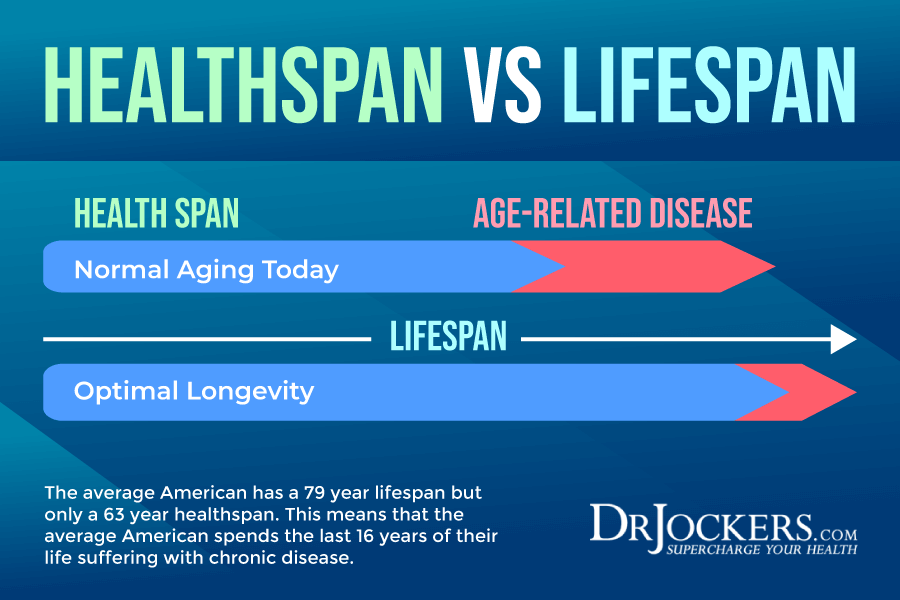
Blue Zones and Longevity
It’s clear that, beyond genetics, economic circumstances and other factors may play a role. Looking at the blue zones of the world, however, can let us get a better idea of what the ideal conditions for longevity may look like. The five blue zones of the world, including Okinawa, Japan, Sardinia, Italy, Nicoya, Costa Rica, Ikaria, Greece, and Loma Linda, California, are places where people live the longest and healthiest lives (5).
People in these areas tend to live well into their 90s and have the highest rates of living to a 100 or over without serious health issues slowing them down. Looking at these populations shows how important diet, movement, lifestyle, behavior, community, purpose, and belonging can be to longevity. Moreover, increasing research evidence suggests how diet and lifestyle can help us reduce inflammation, health issues, and accelerated aging, and improve longevity.
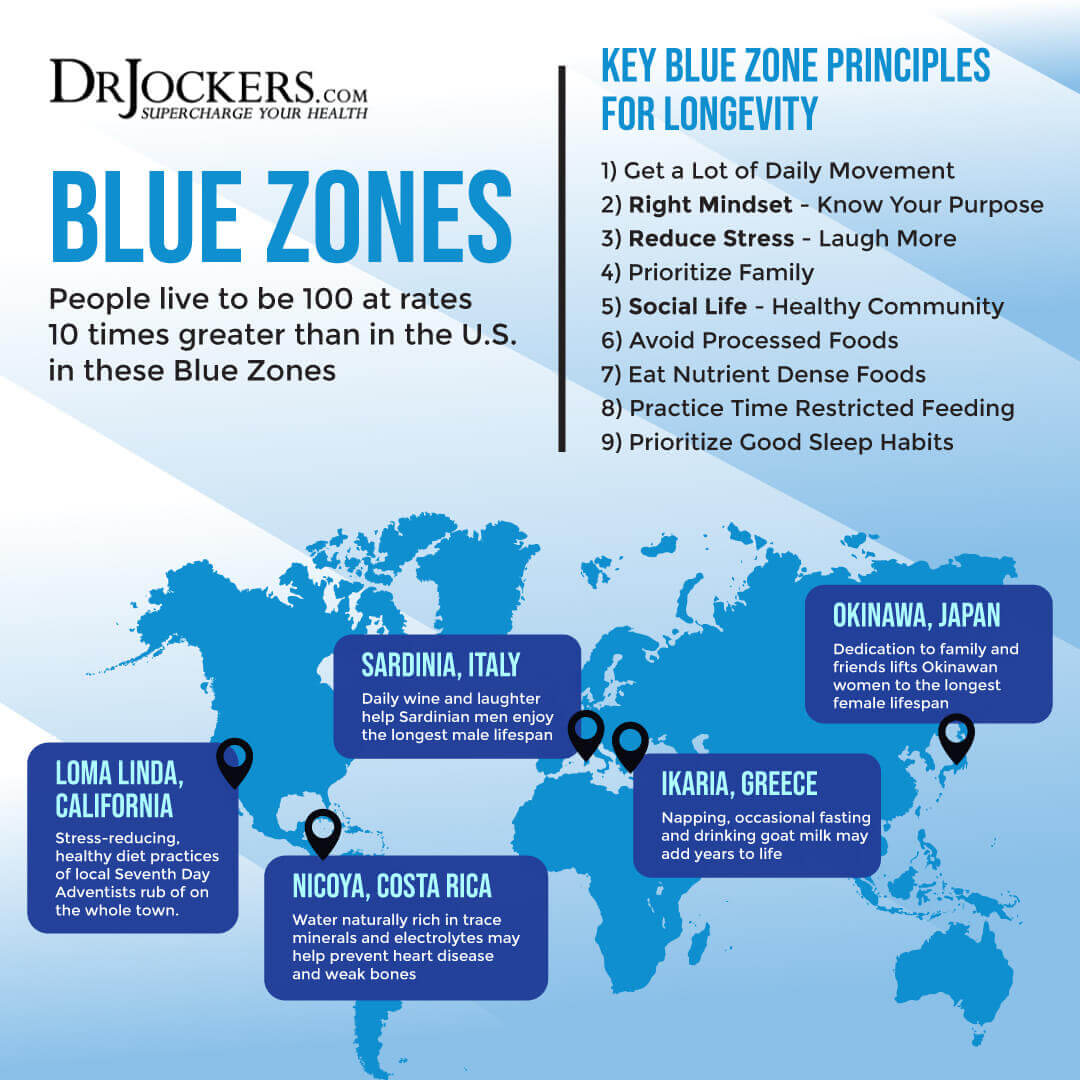
Inflammation at the Root of Accelerated Aging
Acute inflammation is an important protective mechanism your body uses to defend you from harm, including irritants, infections, injuries, and other harmful stimuli. If you twist your ankle, it will swell up and hurt. If you get bit by an insect, it may lead to swelling, redness, itching, or pain. These are all signs of acute inflammation. Acute inflammation alerts your body that there is a problem. Acute inflammation helps repair and recovery. Acute inflammation can even help to prevent sepsis.
As long as its acute, inflammation is acute. However, poor diet, poor lifestyle choices, chronic stress, poor sleep, and toxin exposure can lead to chronic inflammation. Chronic inflammation means that your body is under a constant state of low-grade systemic inflammation. Chronic inflammation is the root cause of most chronic symptoms, modern-day diseases, and accelerated aging.
A 2017 study published in Mucosal Immunology has linked inflammation to gut microbiome imbalance, which can contribute to a variety of health issues (6). A 2020 review published in the Journal of Clinical Medicine has linked chronic inflammation and mitochondrial dysfunction (7). A 2008 study published in the Journal of Internal Medicine has found that mitochondrial dysfunction can contribute to aging (8).
A 2007 study published in FEBS Letters has found an association between chronic inflammation, metabolic inflammation, insulin resistance, and obesity (9). According to a 2020 review published in Diabetology and Metabolic Syndrome, insulin resistance can contribute to aging (10). A 2018 review published in National Reviews, Cardiology has found that chronic inflammation can increase the risk of cardiovascular disease, frailty, and accelerated aging (11).
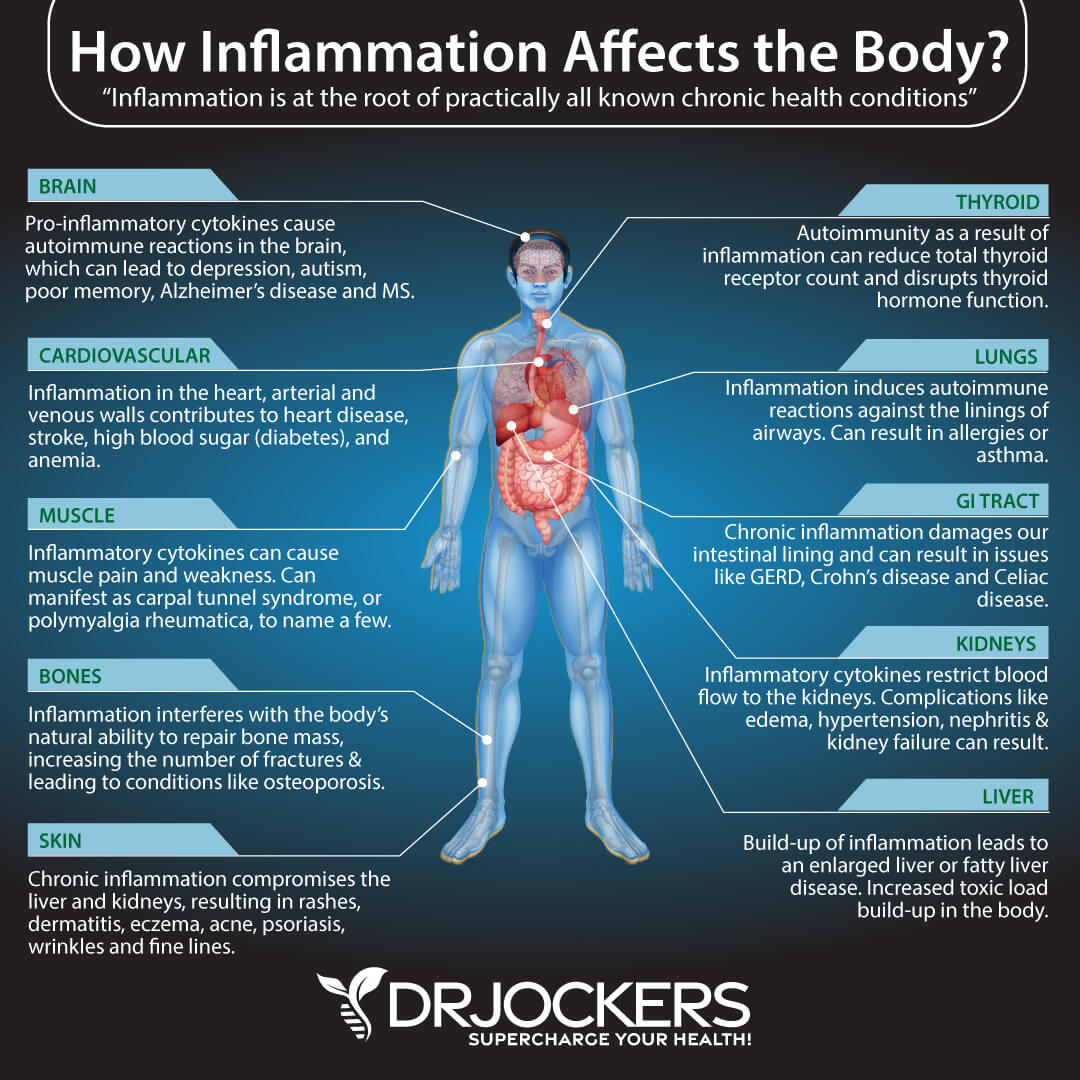
Inflammaging and Senescent Cell Formation
Inflammaging is a term that refers to an upregulated inflammatory response and a low-grade inflammation throughout your body that develop with advanced age and can accelerate the aging process and may worsen some age-related symptoms and diseases. A 2018 review published in Frontiers in Cardiovascular Medicine has linked chronic low-grade inflammation or inflammaging to increased aging (12).
A 2020 review published in Biomedicines has linked chronic stress to chronic inflammation, inflammaging, and accelerated aging (13). You may learn more about inflammaging and what to do about it by reading this article.
When you age poorly, you create excessive oxidative stress within cells that damages the mitochondria and other cellular organelles, and you create senescent or dysfunctional cells. Many researchers have nicknamed these dysfunctional cells “zombie cells,” because they resist death and cause massive problems within our body that accelerate our aging process.

Top Longevity Supplements
Since chronic inflammation has been linked to mitochondrial dysfunction, insulin resistance, gut microbiome imbalance, chronic symptoms, chronic diseases, and accelerated aging, to increase your longevity, it’s important to reduce chronic inflammation through nutrition.
A balanced, nutrient-dense, anti-inflammatory diet rich in greens, vegetables, sprouts, herbs, spices, fermented foods, low-glycemic index fruits, seeds, nuts, grass-fed beef and butter, pasture-raised poultry and eggs, wild-caught fish and seafood, and wild game, is the first step. However, diet alone is often not enough, especially if you are already dealing with nutrient deficiencies, health imbalances, chronic symptoms, chronic health issues, or signs of accelerated aging.
There are various supplements that can help to reduce underlying issues, decrease chronic inflammation, improve balance, and increase longevity. Here are the top longevity supplements I recommend:
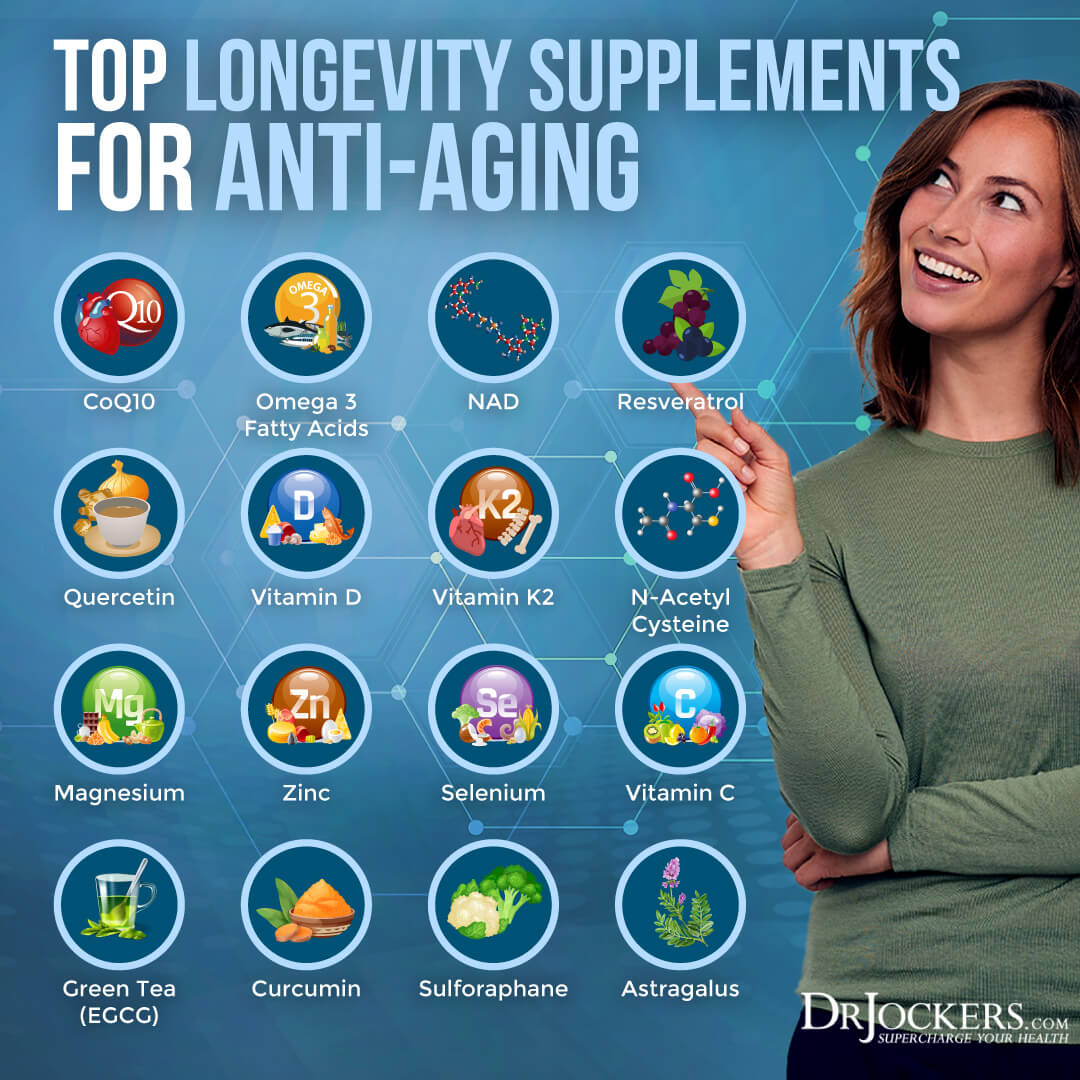
CoQ10
Coenzyme Q10 (CoQ10) is a natural compound that helps to make energy in your cells. A 2014 review published in Frontiers in Biosciences has found that CoQ10 deficiency may increase the risk of age-related oxidative stress, mitochondrial dysfunction, carcinogenesis, and neurodegeneration (14). The review has linked deficiencies in CoQ10 to diabetes, fibromyalgia, neurodegenerative conditions, muscular issues, cardiovascular disease, and cancer.
Your body makes CoQ10 naturally, however, production generally declines as you age. The good news is that you can improve your CoQ10 levels with the help of food and supplements. According to a 2018 review published in Frontiers in Physiology, supplementing with CoQ10 offers antioxidant benefits and may help to reduce the risk of oxidative damage and age-related chronic diseases (15). A 2019 study published in Scientific Reports has found that CoQ10 may help to reduce oxidative stress and improve mitochondrial function (16).
You may benefit from following a diet rich in CoQ10, including eating fatty fish, organ meats, muscle meats, spinach, cauliflower, broccoli, sunflower seeds, and pistachio. I also recommend supplementing with CoQ10 for its health-promoting and anti-aging benefits.
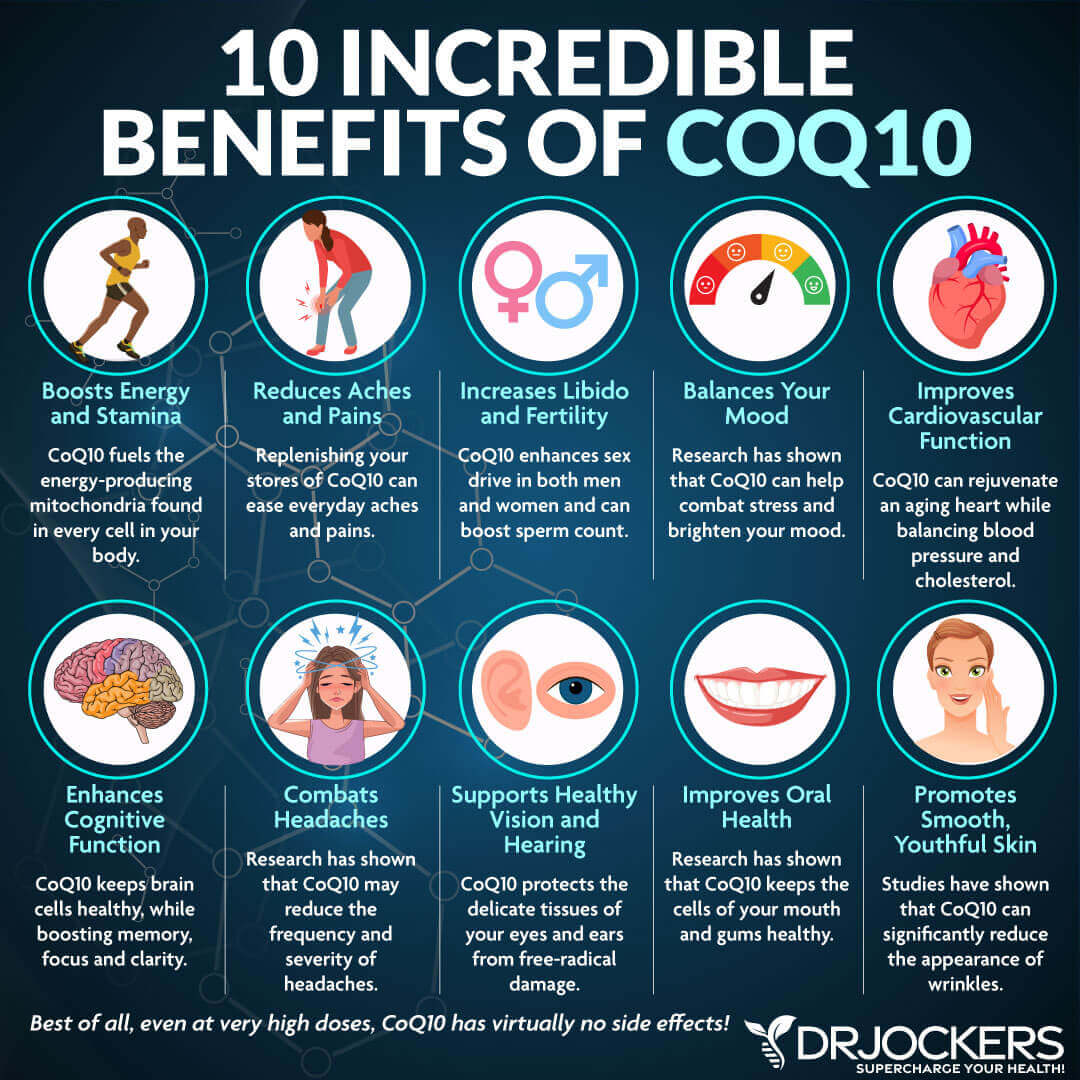
Omega 3 Fatty Acids (EPA/DHA)
Omega-3 fatty acids found in fish, seafood, algae, hemp seeds, chia seeds, and flax seeds are healthy fats that are known to have anti-inflammatory benefits. There are 3 main forms of omega-3 fatty acids.
They include alpha-linolenic acid (ALA), eicosapentaenoic acid (EPA), and docosahexaenoic acid (DHA). Your body cannot make omega-3s. You have to get them through food or supplements. ALA is found in plant foods, such as hemp seed, chia seed, and flaxseed, but not in fish, seafood, or algae.
Though your body can convert some ALA into EPA and DHA, it is only a small amount, and it’s generally not enough. However, your body absolutely needs EPA and DHA to reduce inflammation. The most effective way to meet your EPA and DHA needs through consuming fish and seafood and supplementing with an EPA/DHA omega-3 fish oil supplement.
Omega-3 fatty acids can help to create an omega 3-6-9 balance in your body to reduce inflammation and enhance recovery from health issues. A 2016 study published in Nutrients has found that omega-3 fatty acids can help to improve inflammation in older individuals (17).
A 2019 study published in Aging Clinical and Experiential Research has found that omega-3 supplementation can target inflammaging and benefit the prevention and treatment of sarcopenia, a geriatric syndrome affecting the older population (18).
I recommend eating plenty of omega-3-rich fish and seafood. You may also benefit from eating hemp seed, chia seed, and flaxseed. Additionally, I recommend taking a high-quality omega-3 fish oil supplement. To learn more about the importance of omega-3s, I recommend reading this article.
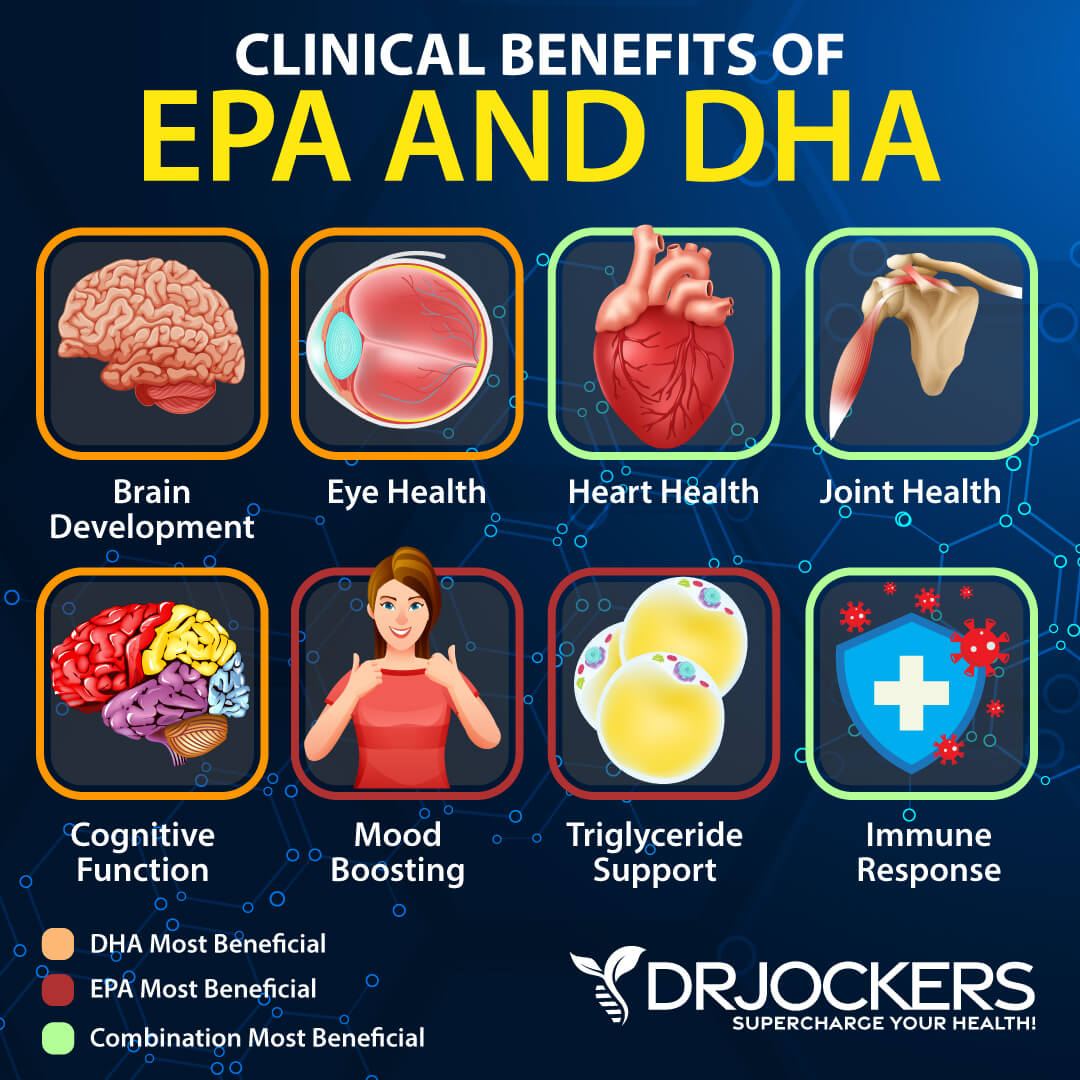
NAD
Nicotinamide adenine dinucleotide (NAD) is a coenzyme necessary for your metabolism. It helps to maintain DNA integrity and may help to protect you from the effects of aging and disease. NAD+ is consistently reduced to NADH and this process moves back and forth in the Redox cycle.
NAD+ is an electron carrier because it carries the electrons of a hydride from one region of a cell to another. The NAD vs NADH conversion process is essential to cellular energy production, mitochondrial function and longevity.
According to a 2017 review published in The EMBO Journal, NAD+ may help to improve mitochondrial homeostasis, lifespan, and health span (19). According to a 2016 study published in Science, NAD+ may help to improve stem cell function and mitochondrial health, contributing to longer longevity (20). According to a 2019 study published in Molecular Medicine Reports, NAD+ may also help to reduce the risk of cognitive decline and Alzheimer’s disease (21).
Though most research is still animal research; results are promising and suggest that NAD+ supplementation may benefit your health and longevity. NAD+ is found in certain fish, including sardines, tuna, and salmon, as well as mushrooms. You may also benefit from supplementation to reduce the effects of aging.
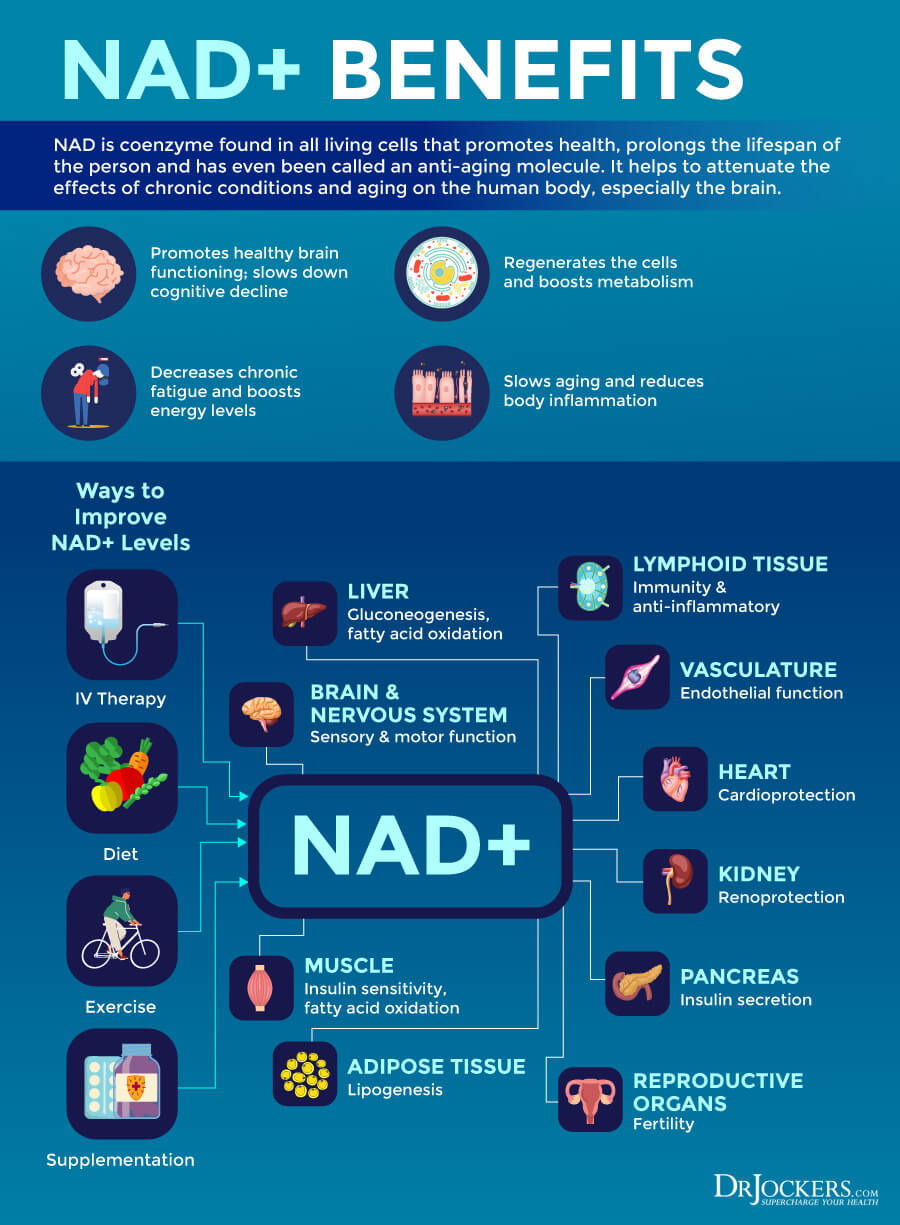
Resveratrol
Resveratrol is a natural plant compound found in grapes, red wine, and certain berries with antioxidant benefits. It offers anti-inflammatory and health-promoting benefits that may help to improve your health and longevity.
According to a 2018 study published in the International Journal of Molecular Science, resveratrol offers anti-inflammatory benefits (22). According to a 2018 study published in Molecular Neurobiology, resveratrol may help to improve brain mitochondrial function (23). A 2017 study published in Oncotarget has found that resveratrol may have anti-aging benefits (24). To improve your longevity, you may benefit from resveratrol-rich foods, including berries and grapes. I also recommend supplementing with resveratrol.

Quercetin
Quercetin is a flavonoid found in various plants with complementary benefits to resveratrol. According to a 2016 study published in Nutrients, quercetin offers benefits for inflammation and your immune system (25). A 2016 review published in Biotechnology Advances has found that quercetin may help to reduce mitochondrial damage and oxidative stress (26). A 2017 study published in the American Journal of Chinese Medicine has also found that quercetin may have anti-aging benefits on the skin (27).
You may benefit from eating lots of quercetin-rich foods, including kale, red leaf lettuce, romaine lettuce, sprouts, snap peas, asparagus, broccoli, cruciferous vegetables, cabbage, chicory greens, herbs, peppers, olive oil, cherries, black plums, black currants, chokeberries, blueberries, and grapes. You may also benefit from supplementing with quercetin for anti-aging.

Vitamin D
Vitamin D is an essential nutrient that is necessary for your muscles, bones, teeth, brain, and immune system. A 2016 study published in Nutrients has also found that vitamin D can improve inflammation in older individuals (27) and promote longevity.
A 2017 mini review published in the European Journal of Clinical Nutrition has found that vitamin D deficiency can contribute to low-grade systemic inflammation associated with aging, and three randomized clinical trials have shown that vitamin D supplementation can lead to an improvement in this inflammation (28). A 2021 study published in the International Journal of Molecular Sciences has found that vitamin D may help to reduce aging of the skin (29).
To improve your vitamin D levels, I recommend spending plenty of time in the sun and consuming foods rich in vitamin D, such as cod liver oil, fatty fish, and egg yolk. Unfortunately, this is not enough, and most of the population suffers from vitamin D deficiency due to indoor living and lack of supplementation.
I recommend supplementing with a vitamin D/K2 supplement daily. You can learn more about vitamin D deficiencies, I recommend reading this article.
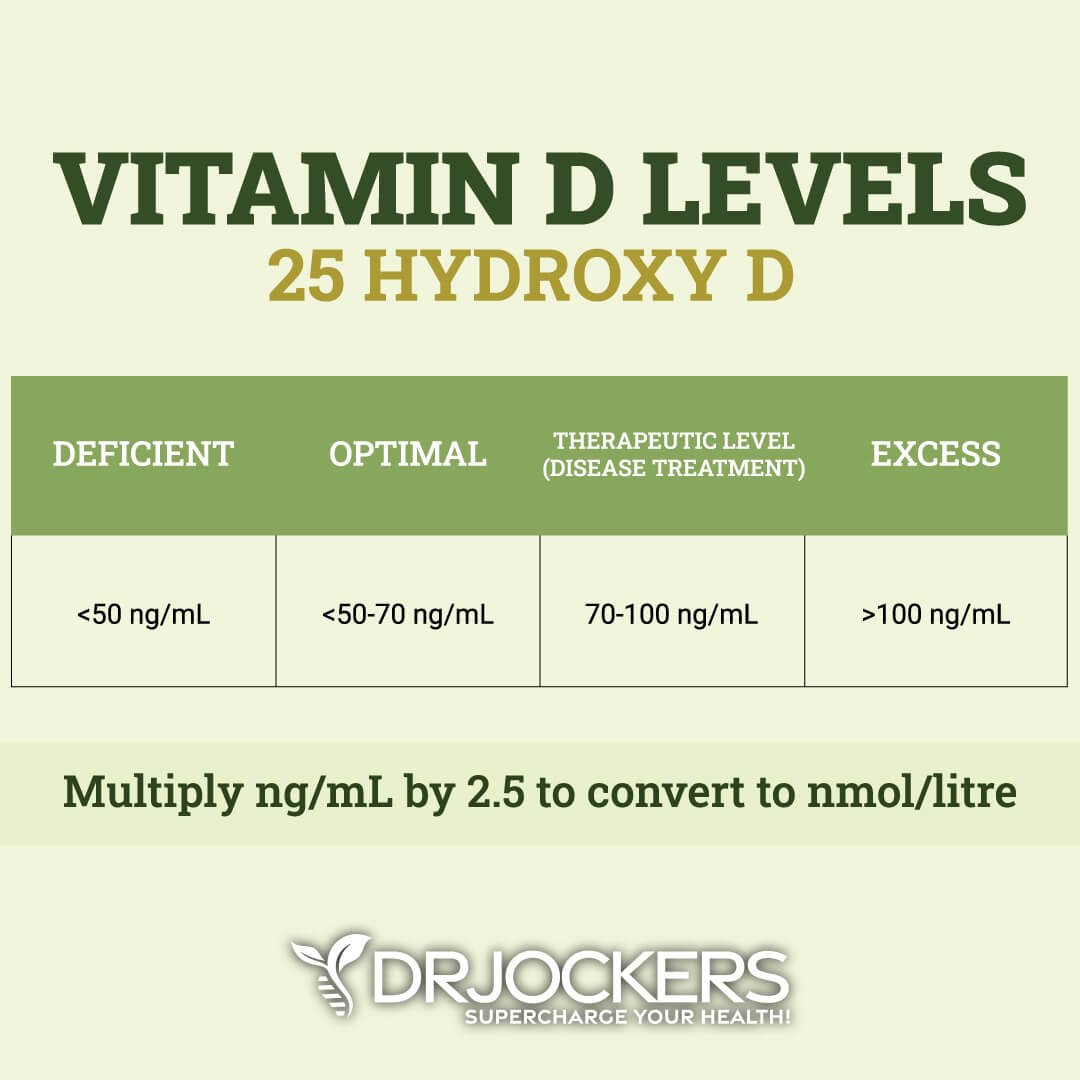
Vitamin K2
Vitamin K is essential for bone health, blood clotting, vitamin D absorption, and calcium metabolism. While vitamin K1 is mostly found in leafy greens, vitamin K2 is mostly found in animal products and leafy greens. Your gut bacteria can also produce vitamin K2.
According to a 2019 review published in the Journal of Osteoporosis, vitamin K2 deficiency may increase the risk of bone fractures, and supplementation may help (30). A 2019 study published in Vitamin and Nutrition Research has found that vitamin K2 may help to reduce the risk of osteoporosis in post-menopausal women (31). According to a 2021 review published in Open Heart, vitamin K2 may reduce arterial stiffness and systemic calcification and improve cardiovascular health (32).
You may benefit from eating foods rich in vitamin K2, including chicken, beef liver, egg yolk, butter, and sauerkraut. I also recommend supplementing with vitamin K in combination with vitamin D using a high-quality vitamin D/K2 supplement.
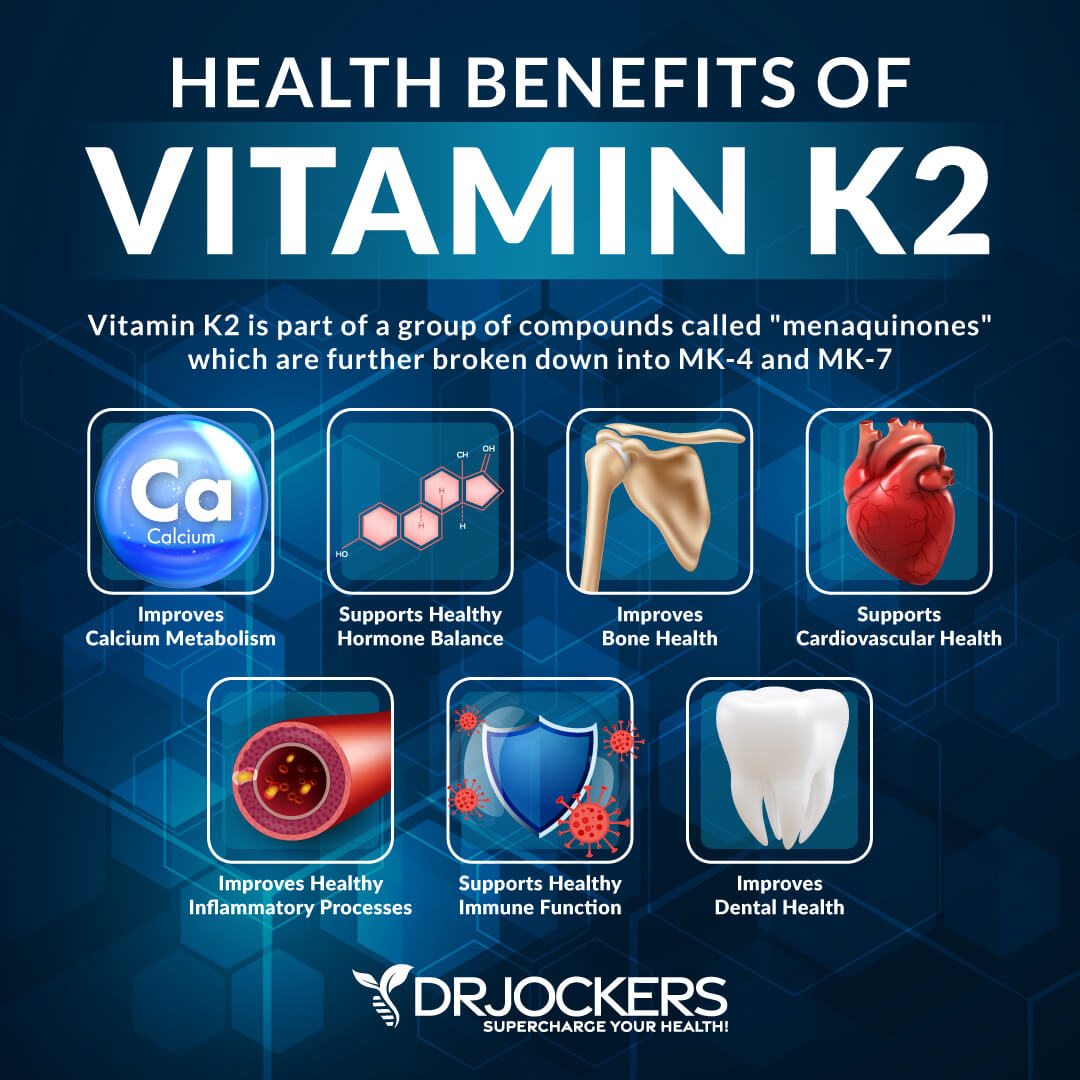
N-Acetyl Cysteine
N-acetyl cysteine (NAC) comes from the amino acid L-cysteine, and your body uses it to produce glutathione which is the body’s master antioxidant. A 2019 study published in Current Rheumatology Reviews has found that oral supplementation with NAC may help to reduce inflammation and oxidative stress (33).
A 2021 study published in Biomedicines has found that NAC may help to reduce mitochondrial damage (34). By supporting mitochondrial health, NAC and glutathione in general, help to improve longevity.
I recommend eating certain high-protein foods that contain NAC, including pasture-raised chicken, turkey, and eggs, wild-caught-fish fish, as well as sunflower seeds, onion, garlic, and cruciferous vegetables. I also recommend supplementing with NAC for its anti-aging benefits.

Magnesium
Magnesium is an important mineral that plays a role as a cofactor in over 300 enzyme systems that help to regulate a variety of biochemical reactions and functions in your body. Magnesium plays a role in muscle health, nerve function, protein synthesis, energy production, glycolysis, blood glucose control, and blood pressure regulation.
A 2018 study published in the Journal of Inflammation Research has found that magnesium deficiency may be connected to higher inflammation levels (35). A 2020 study published in EMBO Molecular Medicine has found that magnesium may help to reduce mitochondrial dysfunction, improve antioxidant capacity, and increase lifespan (36). A 2021 study published in Nutrients has found that magnesium may help to reduce oxidative stress and the risk of age-related chronic conditions (37).
Foods rich in magnesium include dark leafy greens, pumpkin seeds, almonds, cashews, broccoli, and avocado. However, due to our depleted soils, even these are often low in magnesium. Meeting your magnesium needs through food alone can be difficult, and magnesium deficiencies are rampant. You may benefit from supplementing with magnesium for improved health.

Zinc
Zinc is a mineral that’s incredibly important for your immune system, metabolic function and overall longevity. According to a scientific paper published in Pathobiology in Aging & Age-Related Diseases, zinc deficiency is quite common in the elderly population and can contribute to oxidative inflammatory aging and the gradual deterioration of the immune system with age (38).
According to a 2018 study published in the Journal of Physiological Sciences, zinc deficiency may increase inflammation, oxidative stress, poor glucose metabolism, and poor lipid metabolism (39). They found that supplementation may help.
A 2020 study published in Current Developments in Nutrition has found that zinc may play a role in improving chronic inflammation and immune dysfunction (40). Moreover, a 2019 study published in Mechanisms of Aging and Development has discussed the importance of zinc as well as a healthy copper to zinc ratio in relation to aging and health (41).
You may benefit from consuming foods rich in zinc, such as meat, poultry, certain seafood, and nuts. Additionally, I recommend supplementing with zinc for better health and anti-aging. To learn more about the importance of zinc and the problems with zinc-copper imbalance, I recommend reading this article.

Selenium
Selenium is an essential trace mineral and a powerful antioxidant. A 2012 study published in Antioxidants and Redox Signaling has found that selenium may help to reduce inflammation and support immune health (42).
According to a 2020 study published in Frontiers in Immunology, selenium may help to reduce inflammation and support the central nervous system (43). According to a 2019 review published in Aging Clinical and Experimental Research, selenium may reduce the risk of aging and age-related diseases (44).
Brazil nuts are the best source of selenium. Only two Brazil nuts can cover your daily selenium needs. Other selenium-rich foods include tuna, sardines, shrimp, turkey, green peas, broccoli, and spinach. If you are deficient in selenium, you may also benefit from supplementation.

Vitamin C
Vitamin C is a vitamin I probably don’t have to explain to you. It’s the vitamin most people are reaching for when feeling sick. But vitamin C has more powers than that. Vitamin C offers antioxidant benefits, supports the immune system, helps to repair tissues, supports collagen production, and more.
According to a 2017 review published in Nutrients, vitamin C helps to protect the skin from UV damage and offers antioxidant protection (45). According to a 2020 study published in the Journal of Cosmetic Dermatology, topical use of vitamin C may help with skin elasticity, color, smoothness, and radiance and may help to reduce wrinkles and other signs of skin aging (46). According to a 2019 study published in Medical Archives, vitamin C may also help to improve joint pain (47).
I recommend consuming foods rich in vitamin C, including lemon, lime, other citrus, strawberries, pineapple, guava, acerola cherries, bell pepper, broccoli, Brussels sprouts, and cabbage. You may also benefit from supplementing with vitamin C for immune health, joint health, and skin health. You may also try topical vitamin C to reduce aging of your skin.
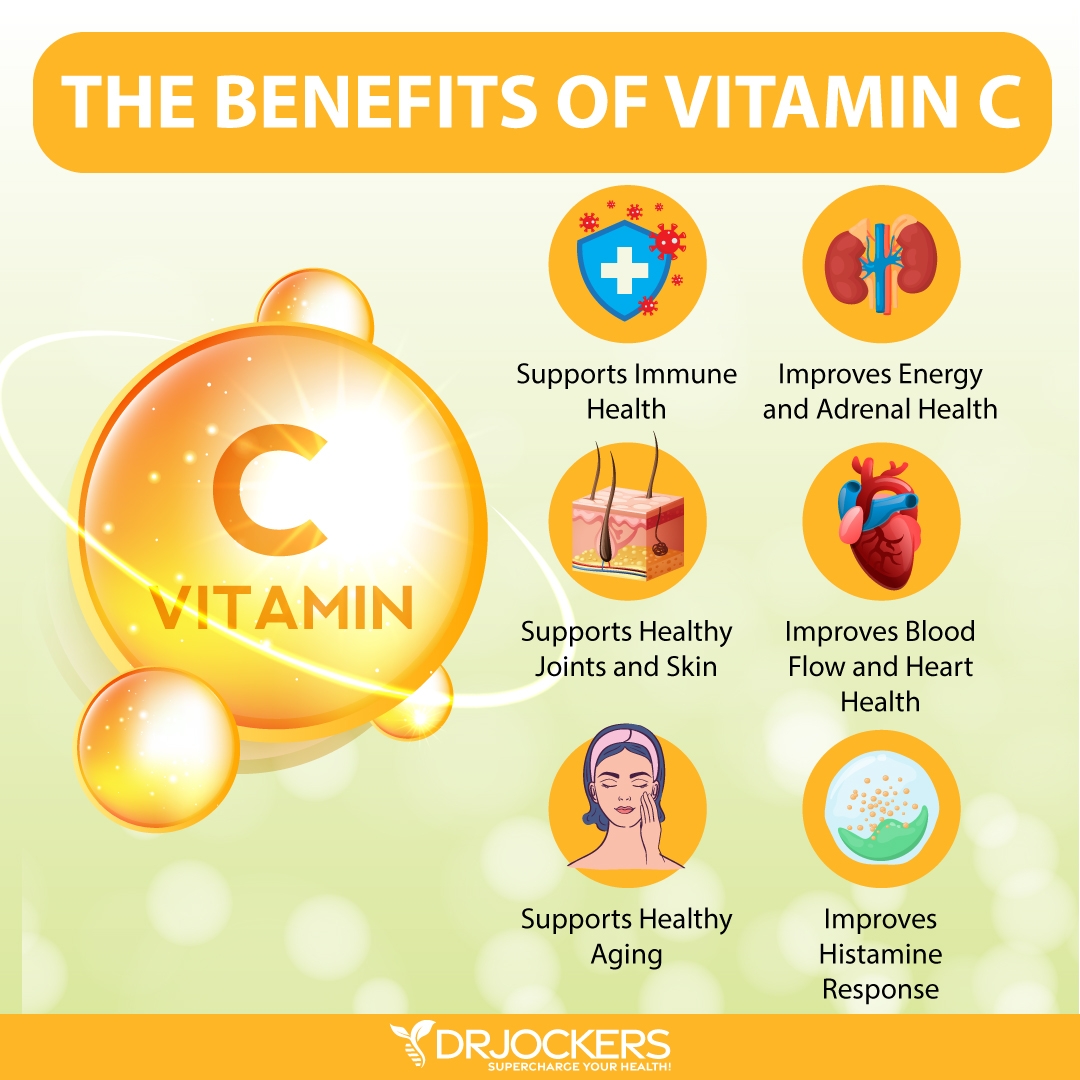
Green Tea (EGCG)
Epigallocatechin gallate (EGCG) is a plant compound found in green tea. It is also found in black tea, white tea, oolong tea, cranberries, blackberries, strawberries, cherries, peaches, apples, pears, kiwi, avocados, pistachio, pecan, and hazelnuts in small amounts. EGCG is a powerful antioxidant with a multitude of health benefits. It may help to reduce inflammation, help weight loss, and reduce the risk of brain and heart issues.
A 2019 study published in Dove Press has found that EGCG may help to reduce inflammation (48). A 2018 study published in Food and Chemical Toxicology has found that EGCG may help to improve mitochondrial function and reduce oxidative stress (49). According to a 2018 review published in the Journal of Ethnopharmacology, ECGC may help to reduce the risk of cardiovascular and metabolic disease (50).
You may benefit from drinking green tea and other tea or foods that contain some EGCG. You may also benefit from taking green tea extract or EGCG supplements. If you have histamine intolerance, drinking green tea may increase histamine levels, but green tea extract does not.
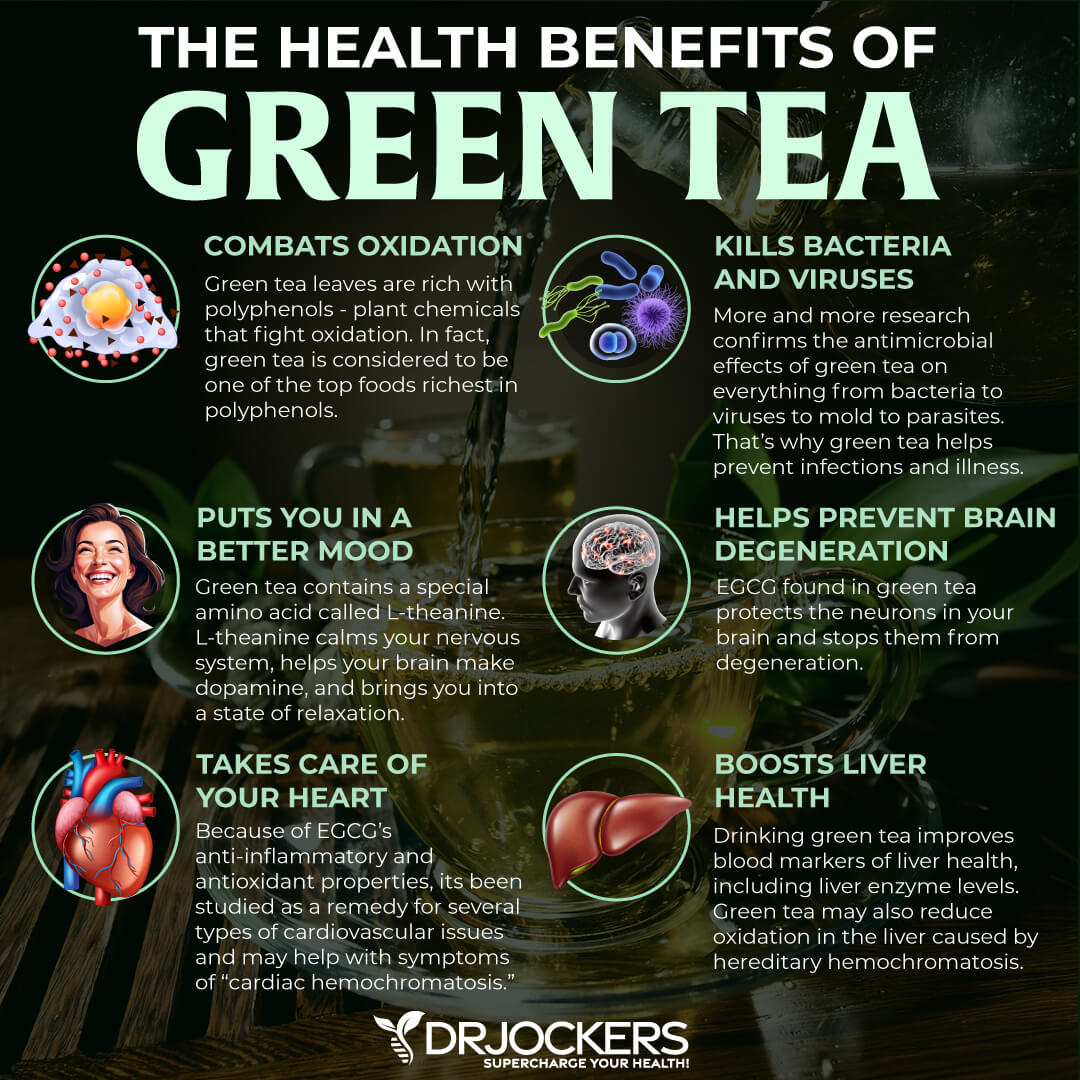
Curcumin
Curcumin is the active ingredient of turmeric, one of the best research herbs for inflammation and pain. According to a 2017 review published in Foods, curcumin may help to reduce inflammation, muscle soreness, joint pain, arthritis, inflammatory conditions, metabolic syndrome, hyperlipidemia, and anxiety (51).
According to a 2016 systematic review and meta-analysis of randomized trials published in the Journal of Medicinal Food, curcumin is beneficial for inflammation and pain and can reduce symptoms of joint arthritis, a common problem in older people (52). According to a 2021 review published in BMJ Open Sport and Exercise Medicine, curcumin can help to reduce joint pain and improve function in arthritis (53). According to a 2019 review published in the International Journal of Molecular Sciences, curcumin may help to reduce chronic inflammation associated with aging, the risk of frailty and age-related diseases, and tumor growth (54).
You may benefit from adding turmeric to your diet. You can use it as a spice in your soups, dressings, dishes, golden tea, smoothies, and green juices. I also recommend using a daily curcumin supplement for inflammation, pain, and other health issues.
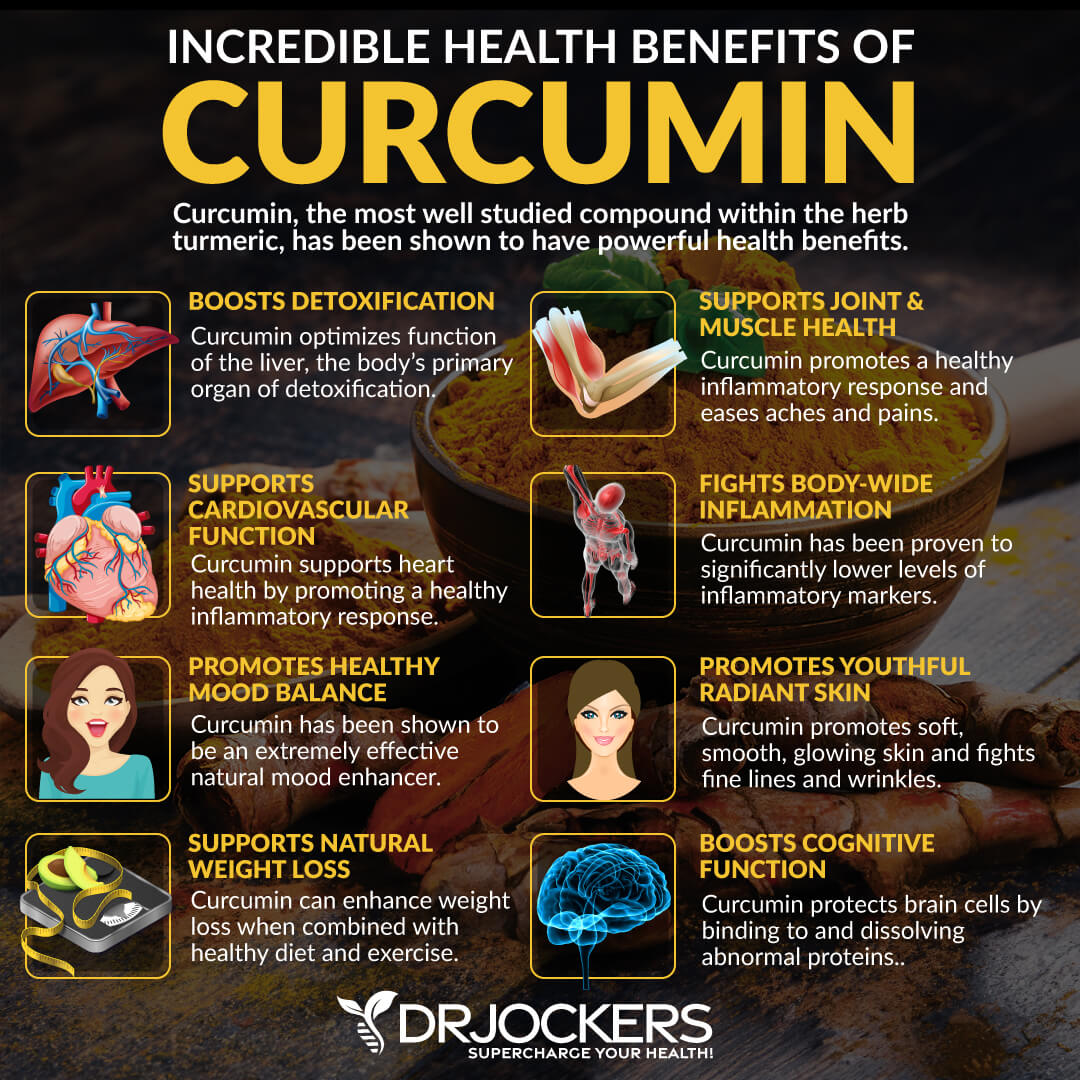
Sulforaphane
Sulforaphane is a natural compound found in some plant foods, including cruciferous vegetables, such as cabbage, broccoli, cauliflower, and kale. Sulforaphane is the most known for its benefits for digestion, heart health, diabetes, and brain health.
A 2017 study published in Science Translational Medicine has found that sulforaphane may help to improve blood glucose levels and glucose production (55). A 2017 study published in Oxidative Medicine and Cellular Longevity has found that sulforaphane may help to decrease oxidative stress and reduce the risk and improve chronic diseases (56). A 2020 review published in Antioxidants (Basel) has found that sulforaphane in cruciferous vegetables may help to reduce oxidative stress, inflammation, and fatigue (57).
I recommend following a diet rich in sulforaphane foods, including broccoli, kale, and cauliflower. You may also benefit from supplementation with sulforaphane.
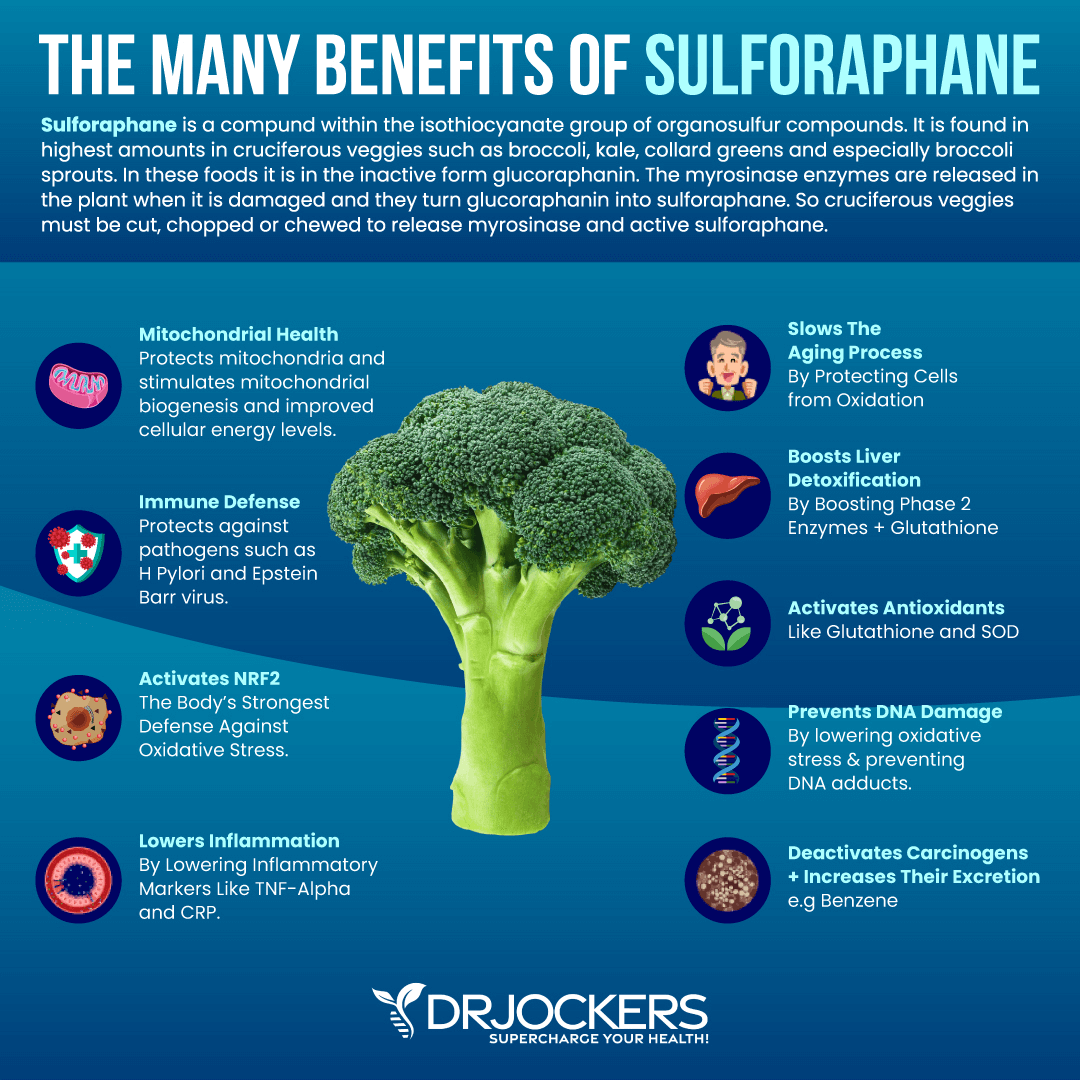
Astragalus
Astragalus is an herb that is commonly used as a supplement for a variety of health issues. It is often used for upper respiratory infections, colds, diabetes, fibromyalgia, and heart health. A 2017 study published in Aging and Disease has found that astragalus may have anti-aging, anti-brain aging, anti-vascular aging, and anti-cancer effects (58).
Astragalus has been shown to support the immune system by activating T & B lymphocytes and dendritic cells which work together to trigger the proper immune response to target invading pathogens and viruses. The flavonoids, saponins and triterpenoids help to reduce oxidative stress and inflammation and support cellular resistance to stress.
A 2018 study published in the International Journal of Molecular Sciences has found that astragalus may help to reduce oxidative stress and inflammation (59). A 2021 study published in Frontiers in Pharmacology has found that astragalus may help to reduce skin inflammation and improve skin health (60).
A 2021 study published in the Journal of Functional Foods has found that consuming astragalus may help to support the health of people undergoing treatment for neurodegenerative disease, diabetes, cancer, and other chronic diseases (61). I highly recommend drinking astragalus tea or using astragalus as a supplement.
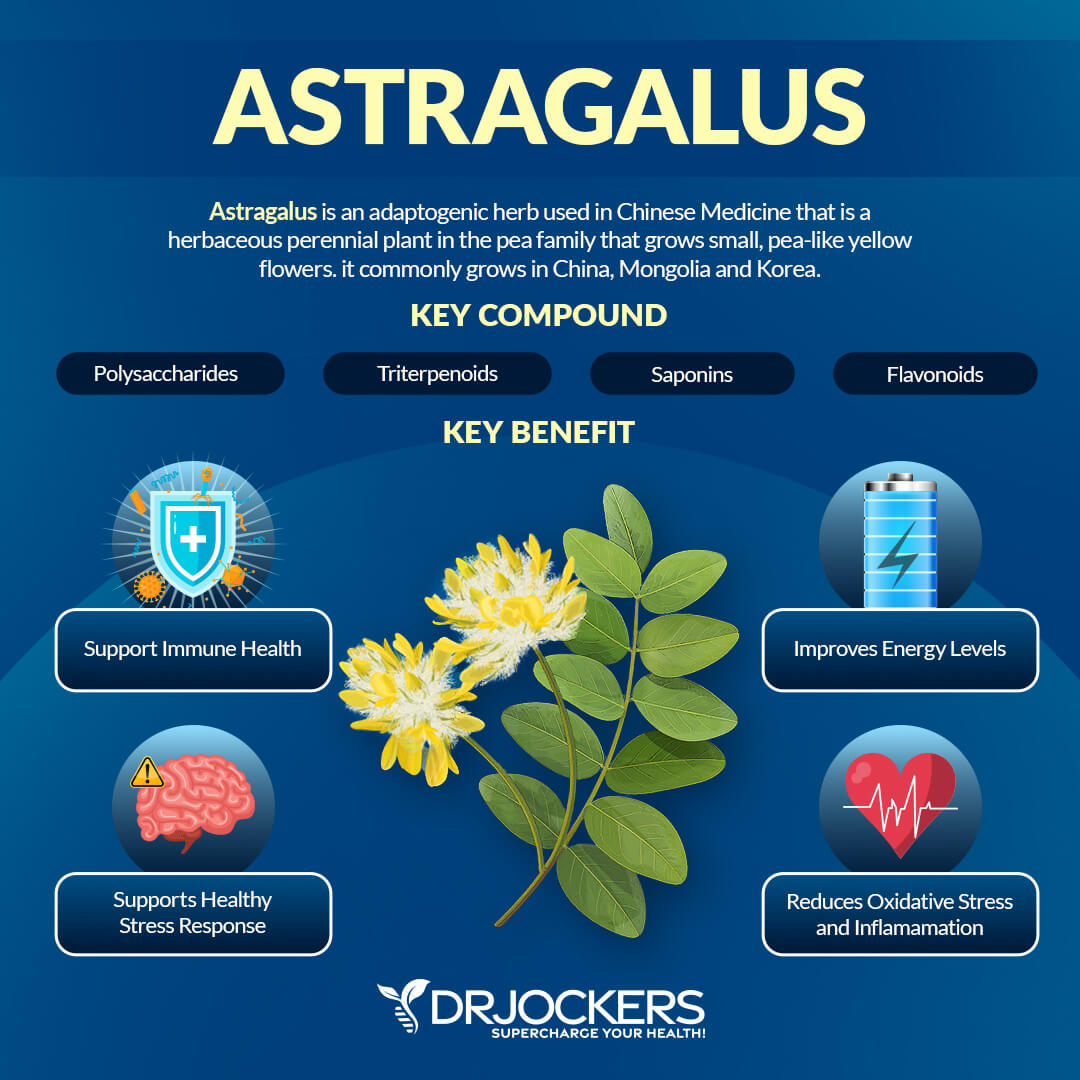
Longevity Supplement Regimen
To reduce inflammation, improve your health, and increase your longevity, I recommend the following longevity supplement regimen.
Immunocharge
I recommend taking Immonocharge for immune and overall health. This supplement includes quercetin, resveratrol, magnesium, zinc, NAC+, vitamin A, C, D, and K2. It offers antioxidant support, antiviral properties, and immune support. It may help to reduce the histamine response, oxidative stress, and inflammation.
It may help to improve mitochondrial health, heart health, circulation, blood sugar and insulin levels, hormonal health, brain health, cognition, energy, and sleep. I recommend taking 2 capsules 2 times a day.
***Special Offer: Save 30% on Immunocharge with the coupon code Immune30 at checkout!
Super CoQ10
I recommend taking Super CoQ10. It features a unique combination of ubiquinol and geranylgeraniol (GG), two physiologically essential molecules with complementary and synergistic actions. GG complements the actions of ubiquinol due to its unique ability to boost endogenous coenzyme Q10 (CoQ10) synthesis and efficient cellular permeability. Ubiquinol is the reduced form of CoQ10 and is provided as DuoQuinol™, an innovative, patent-pending form of this molecule from American River Nutrition (ARN).
Geranylgeraniol (GG) is an important endogenous molecule in human physiology — it is a precursor in the synthesis of ubiquinol and many other functional cell metabolites and signaling molecules. GG is a naturally occurring terpenoid in a variety of plants and serves as a precursor to essential components, such as carotenoids. The GG in DuoQuinol™ is GG-Gold™, a patented form also from ARN. This supplement helps to improve mitochondrial health, cellular energy, heart health, brain health, and liver health. I recommend taking 1 soft gel per day with a meal.
Pro Omega Curcumin
I recommend Pro Omega Curcumin with omega-3 EPA and DHA, NAC, L-glutathione, and curcumin extract. This unique formulation is the most powerful nutraceutical on the market for down-regulating inflammation and oxidative stress quickly. It may help to reduce inflammation and oxidative stress.
It may also help to improve your gut lining, vascular elasticity, skin health, sleep, performance, recovery, liver health, muscle pain, joint pain, and energy. It may help to reduce cellular aging and gene expression. I recommend taking 3 capsules once a day.
Final Thoughts
You probably want to live a long, healthy, energetic, and active life without inflammation, pain, and disease slowing you down. A healthy diet and lifestyle and using the right longevity nutrients can help you to stay healthy and energetic through old age.
I recommend following the longevity supplement regimen in this article to help reduce inflammation, mitochondrial dysfunction, oxidative stress, other imbalances, and the risk of disease and help to improve your energy, health, and longevity.
If you want to work with a functional health coach, I recommend this article with tips on how to find a great coach. On our website, we offer long-distance functional health coaching programs. For further support with your health goals, just reach out—our fantastic coaches are here to support your journey.
Inflammation Crushing Ebundle
The Inflammation Crushing Ebundle is designed to help you improve your brain, liver, immune system and discover the healing strategies, foods and recipes to burn fat, reduce inflammation and Thrive in Life!
As a doctor of natural medicine, I have spent the past 20 years studying the best healing strategies and worked with hundreds of coaching clients, helping them overcome chronic health conditions and optimize their overall health.
In our Inflammation Crushing Ebundle, I have put together my very best strategies to reduce inflammation and optimize your healing potential. Take a look at what you will get inside these valuable guides below!
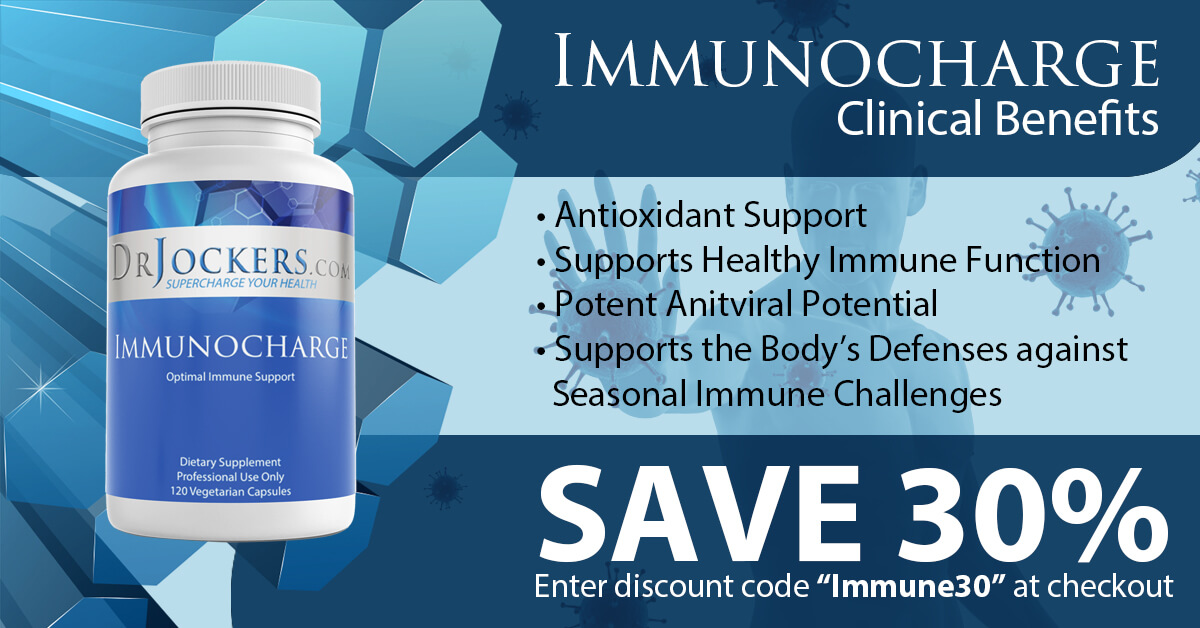






love and appreciate all your information and the explicit way it’s presented, thank you.
how much coenzyme Q10 daily for a 79 year old?
Hello Patricia, I would recommend 200mg of Ubiquinol- 1-2 times daily with meals and see if you notice a difference in your energy levels. If not, try going up to 300-400 mg – 2x daily with meals.
Do you recommend all three supplements for someone who is 64 years old? I had bariatric sleeve surgery. I’m about 16 months out from when I had my surgery. I’m doing multi vitamins as a patch. I have lots of inflammation, stress, (I’m a grandmother raising a 10 yr.old granddaughter), lower back pain, etc. Please advise!
Yes absolutely, I would recommend these 3 supplements for you!
Dr Jocker — This along with your many other articles are extraordinarily useful. For this particular article Is there a recommended dosage for each these supplements vs the standard RDA? I usually look at the RDA as a minimum recommended amount with some nutritionists recommending higher does with possibly a not to exceed number.
Would you please consider making a supplement that COMBINES all these wonderful, anti-inflammation – anti-aging properties? I’d be willing to take 2 to 4 a day obviously because you can’t get it all in one capsule.
Thanks for your consideration ❤️
Yes we have one that has most of these called immunocharge https://store.drjockers.com/products/immunocharge
Are those vegetables such as cauliflowers and similar better cooked or raw or does it matter at all?
Yes cauliflower is easier to digest cooked, but when you cook it, it will lose nutrients. I like steaming the best to soften the fibers but preserve as much nutrients as possible.
Hi,
I have read recent research that has found
NAC can help spread metastasis of cancer cells and should not be taken
by anyone thought to have cancer?
Have you seen this
Thank you for this information. I try to handle hives and would like to ask you of a known to you natural remerdy for this condition.
Greetings
Sorry to hear this! Here is some helpful information: https://drjockers.com/skin-inflammation/